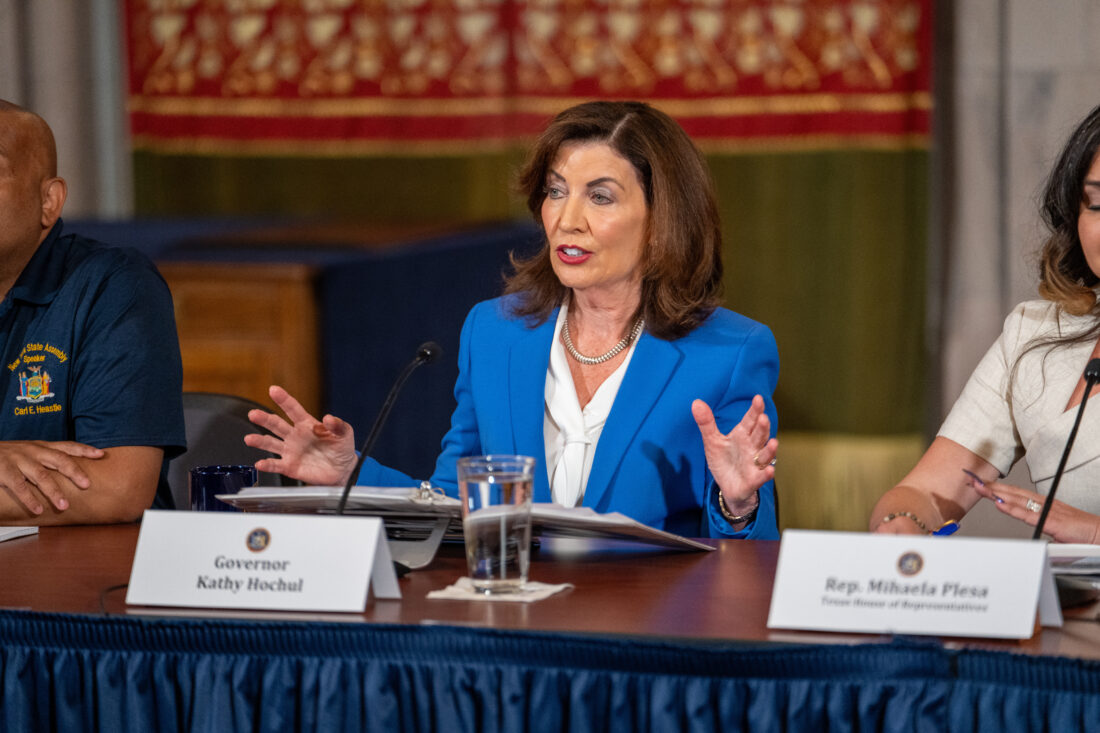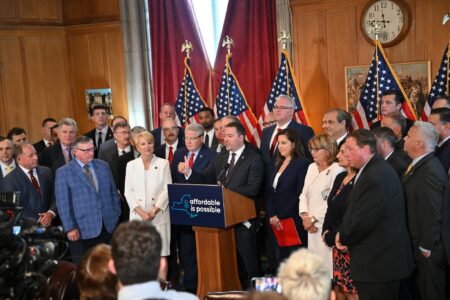New York Democrats Propose Early Redistricting – But Not Until 2028

Gov. Kathy Hochul is pictured during a news conference Monday with Texas Democrats who came to New York to avoid a vote on redistricting congressional lines in Texas.
While Gov. Kathy Hochul and her likely opponent in the 2026 election spar over Texas’ proposal to redraw its congressional boundaries a half-decade early, state Democrats have introduced a legislative response that will take three years to come to fruition.
Texas Democrats on Monday prevented their state’s House of Representatives from moving forward, at least for now, with a redrawn congressional map sought by President Donald Trump to shore up Republicans’ 2026 midterm prospects. The fight in the Lone Star State had migrated north, as Hochul and Elise Stefanik, House Republican Leadership chairwoman. In Albany, Hochul welcomed Texas legislators to the state Capitol after they departed the state in order to deny Gov. Greg Abbott the quorum he needed to pass a redistricting scheme that Hochul says has national consequences.
While Hochul and Stefanik, Hochul’s likely challenger in 2026, sparred publicly over the Texas redistricting plan, Democrats in the state Legislature are proposing to change the state’s constitution to allow New York to redistrict if another state redistricts more than once in a decade.
“The New York State Constitution generally provides only for decennial redistricting, and thus prevents New York from making more frequent adjustments to congressional district lines even if other states act to do so,” said Sen. Michael Gianaris, D-Astoria and state Senate majority leader. “While New York need not and should not fire the first shot in a battle that results in more frequent, if not continuous, redistricting actions across the country, it should not be precluded participation in such a battle once started by other states.”
Gianaris, D-Astoria and state Senate majority leader, and Democratic Assemblyman have introduced S.8467 as well as a companion bill that is still being processed in the state Assembly. In order to amend the state constitution, legislation has to be passed in consecutive legislative sessions and then in a statewide ballot referendum. The earliest New York could redistrict, then, would be 2028. And, that process would require convening an Independent Redistricting Commission. The independent redistricting process envisioned by former Gov. Andrew Cuomo and both political parties did not go smoothly when used a couple of years ago, with lawsuits filed by Republicans against the Democratic Party-backed plan.
“The amendment proposed by this resolution would be triggered in the event that another state has engaged in mid-decade redistricting, and only then would New York State, by an act of the Legislature, be allowed to determine district lines for congressional offices outside of the standard decennial process. In this fashion, the State would be able to appropriately defend the interests of its residents in response to the actions of other states. While this proposed amendment would not in any case have bearing on the 2026 elections, it could be effectuated in advance of the 2028 or 2030 elections and, more significantly, would address a new status quo that will play out not over one or two election cycles but over decades. New York should not be sidelined for a moment longer than necessary,” Gianaris wrote in his legislative justification.
At the center of the escalating impasse is Trump’s hope of adding five more GOP-leaning congressional seats in Texas before the upcoming midterms. That would bolster his party’s chances of preserving its slim U.S. House majority, something Republicans were unable to do in the 2018 midterms during Trump’s first presidency. Republicans currently hold 25 of Texas’ 38 seats. That’s nearly a 2-to-1 advantage and already a wider partisan gap than in the 2024 presidential election, when Trump won 56.1% of the vote, while Democrat Kamala Harris received 42.5%.
Texas Gov. Greg Abbott insisted ahead of Monday’s scheduled session that lawmakers have “absconded” in violation of their sworn duties to the state. A refusal by Texas lawmakers to show up is a civil violation of legislative rules. As for his threat to remove the lawmakers, Abbott cited a nonbinding legal opinion issued by Republican Attorney General Ken Paxton amid an partisan quorum dispute in 2021. Paxton suggested a court could determine that a legislator had forfeited their office.
“I believe they have forfeited their seats in the state Legislature because they are not doing the job they were elected to do,” he said in the Fox News interview, invoking his state’s hallmark machismo to call the lawmakers “un-Texan.”
The lawmakers who left declined to say how long they will hold out while questioning Abbott’s ability to force them back to Texas.
“I believe they have forfeited their seats in the state Legislature because they are not doing the job they were elected to do,” he said in the Fox News interview, invoking his state’s hallmark machismo to call the lawmakers “un-Texan.”






